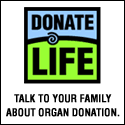Myths about organ donation
Myth: If doctors know you’re an organ donor, they won’t work as hard to save you.
Fact: If you are sick or injured and admitted to the hospital, the number one priority is to save your life. Organ donation can only be considered if you die and after your family has been consulted.
Myth: When you’re waiting for a transplant, your financial status or celebrity status is as important as your medical status.
Fact: When you are on the transplant waiting list for a donor organ, what really counts is the severity of your illness, time spent waiting, blood type and other important medical information.
Myth: Having "organ donor" noted on your driver's license is all you have to do to become a donor.
Fact: While a driver's license with an "organ donor" designation are legal documents, organ and tissue donation is always discussed with family members prior to the donation. To ensure that your family understands your wishes, it is important that you share your decision to donate LIFE.
Myth: I am 60 years old. I am too old to be a donor.
Fact: People of all ages and medical histories should consider themselves potential donors. Your medical condition at the time of death will determine what organs and tissue can be donated.
Myth: My family will be charged for donating my organs.
Fact: There is no cost to the donor's family or estate for organ and tissue donation. Funeral costs remain the responsibility of the family.
Myth: A man went to a party and woke up the next morning in a bathtub full of ice. One of his kidneys is stolen for sale on the black market.
Fact: There is no documented case of this ever happening. First, it is illegal to buy and sell organs . Second, due to the complexity of transplantation, piracy is practically impossible. The process of matching donors with recipients, the need for highly skilled medical professionals to perform the surgery, and the need for modern medical facilities and support necessary for transplantation make it highly unlikely that this system could be duplicated in secrecy.
Myth: Many people have legitimate religious reasons not to donate.
Fact: All major religions approve of donation. All major religions support the decision to donate, typically considering it a generous act that is the individual's choice.
Myth: A history of medical illness or advanced age will automatically eliminate your chance for becoming a donor.
Fact: Age limits for organ donation no longer exist, and at the time of death, qualified medical personnel will review medical and social histories to determine donor suitability on a case-by-case basis.
Myth: Becoming an organ and tissue donor will leave my body disfigured.
Fact: Donated organs and tissues are removed surgically, in a routine operation similar to gallbladder or appendix removal. Donation does not disfigure the body or change the way it looks in any way.
Myth: People can recover from brain death.
Fact: It is impossible to recover from brain death. This is a common misconception about the difference between coma and brain death. In a coma (or in varying states of unconsciousness) the brain still functions - even though it may be at a decreased level of function. Patients may, or may not, improve from their unconscious state, but they are not brain dead. Death can occur in two ways: 1) when the heart and lungs stop functioning, and 2) when the brain stops functioning. In cases of brain death, there are no brain waves present, blood will cease to flow to the brain, pupils are unresponsive, and there is no eye movement in response to stimulus. Extensive tests are conducted over a period of hours to rule out every possible sign of brain function.
Myth: Organ recipients acquire their donor's characteristics.
Fact: It is scientifically impossible for transplant recipients to acquire their donor's characteristics. Transplanted organs do not have a memory. The power of suggestion or the experience of the illness and transplant may have an effect on the individual. This can cause the recipient to develop a liking for certain activities not previously enjoyed. Although some transplant recipients believe they acquired their donor's characteristics, this phenomenon has no scientific basis.

Return to top of page
back to top
   | 



